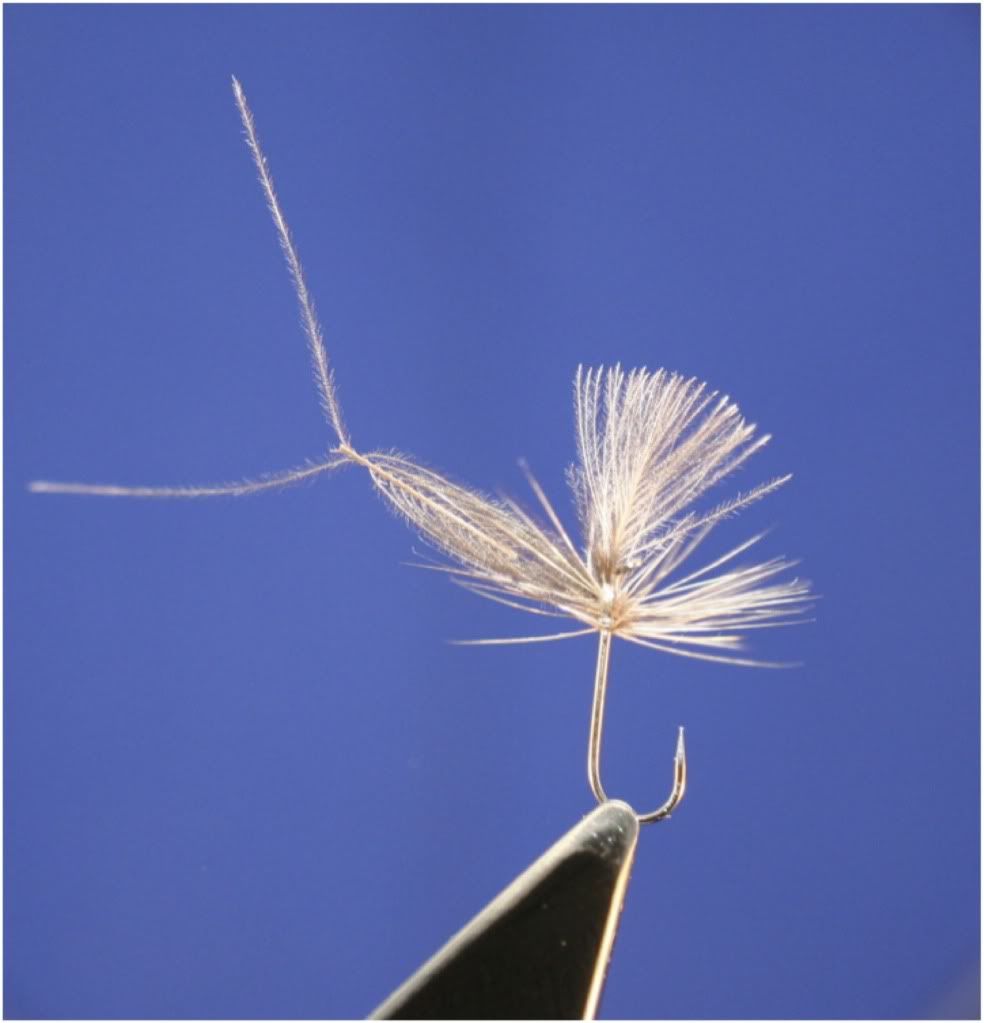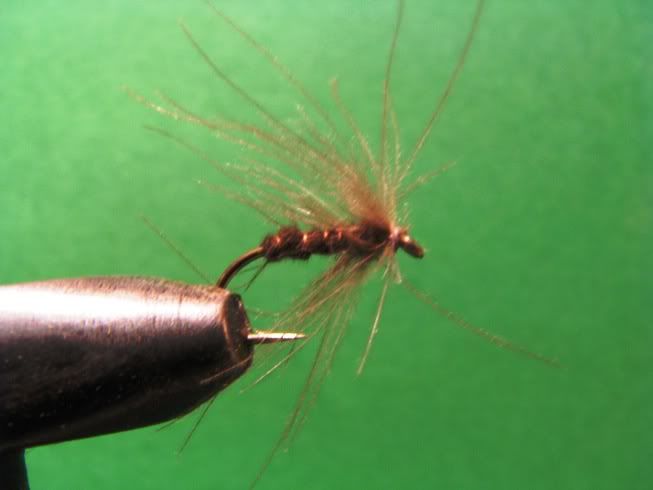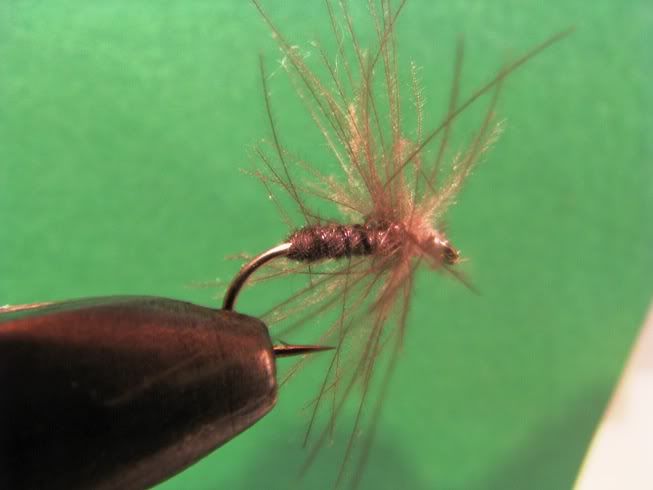Can we class a CDC feather as a soft hackle?
Moderators: William Anderson, letumgo
-
flyfishwithme
Can we class a CDC feather as a soft hackle?
What are your thoughts? I have completed reading two books on CDC (Leon Links and an Italian book) and it appears to me that these feathers could be classed as 'soft hackles'.
Should we have a whole section just for CDC flies?
What are your thoughts?
Should we have a whole section just for CDC flies?
What are your thoughts?
-
DUBBN
Re: Can we class a CDC feather as a soft hackle?
I am sure you can categorize them as Soft Hackle, but it may cause a bit of confusion. I am speaking for myself here. I do not care for CDC as a subsurface material. Most people that do like it, do so because of it's buoyant properties. I am one of the last people to talk about tradition, but for me, saying CDC is a Soft Hackle material is a stretch.
That being said, I really do not have a problem with you categorizing it as such.
That being said, I really do not have a problem with you categorizing it as such.
- William Anderson
- Site Admin
- Posts: 4569
- Joined: Mon Feb 23, 2009 3:14 pm
- Location: Ashburn, VA 20148
- Contact:
Re: Can we class a CDC feather as a soft hackle?
Some of the nicest soft-hackle patterns I've seen are tied with hairs or guard hairs wound as a hackle. I can't see getting exclusive and omitting CdC, or marabou or philoplume, but to each their own, whether you like them or not. Labels are not often helpful for me.
w
w
"A man should not try to eliminate his complexes, but rather come into accord with them. They are ultimately what directs his conduct in the world." Sigmund Freud.
www.WilliamsFavorite.com
www.WilliamsFavorite.com
-
Mataura mayfly
- Posts: 3648
- Joined: Thu Oct 27, 2011 6:28 am
- Location: Southland, South Island, New Zealand.
Re: Can we class a CDC feather as a soft hackle?
It probably depends on your interpretation of the words "soft hackle".
Do you see it as the shape or form of a fly, a pattern type and therefore you are happy with any hackle material used like hair (as stated above by William), barbs from other feathers or synthetic materials. As long as the fly has no wing and is tied in soft hackle form.
Or you believe that a soft hackle is only to be tied with true soft hackle feathers as they were first designed and tie to traditional materials and patterns.
I myself would have no problems with CDC for hackle. It is soft, flowing and has nice action in the water.
Do you see it as the shape or form of a fly, a pattern type and therefore you are happy with any hackle material used like hair (as stated above by William), barbs from other feathers or synthetic materials. As long as the fly has no wing and is tied in soft hackle form.
Or you believe that a soft hackle is only to be tied with true soft hackle feathers as they were first designed and tie to traditional materials and patterns.
I myself would have no problems with CDC for hackle. It is soft, flowing and has nice action in the water.
"Listen to the sound of the river and you will get a trout".... Irish proverb.
-
flyfishwithme
Re: Can we class a CDC feather as a soft hackle?
Very interesting and I am by no means advocating either way.
My thinking came from a number of things as I have been experimenting with replacing game hackles with 1-2 wraps of CDC on some of my wets with great success. I have also fished with a couple of Europeans who have tied flies similar to a 'flymph' and fished them the same was as Big Jim. It was not the buoyancy that was attractive but the translucent effect of minute air bubbles trapped in the CDC that worked.
Marc Petijean (Swiss) had tied a range of wet and dry flies using CDC.
I wonder what fly tiers would have done 100/200 years ago with wets if they had discovered CDC?
Yes you could argue that CDC is a 'dry fly' material BUT have we experimented enough with it sub surface.
A dedicated subject, given the innovation I see from forum participants, might produce some great patterns.
Philip
My thinking came from a number of things as I have been experimenting with replacing game hackles with 1-2 wraps of CDC on some of my wets with great success. I have also fished with a couple of Europeans who have tied flies similar to a 'flymph' and fished them the same was as Big Jim. It was not the buoyancy that was attractive but the translucent effect of minute air bubbles trapped in the CDC that worked.
Marc Petijean (Swiss) had tied a range of wet and dry flies using CDC.
I wonder what fly tiers would have done 100/200 years ago with wets if they had discovered CDC?
Yes you could argue that CDC is a 'dry fly' material BUT have we experimented enough with it sub surface.
A dedicated subject, given the innovation I see from forum participants, might produce some great patterns.
Philip
-
Mataura mayfly
- Posts: 3648
- Joined: Thu Oct 27, 2011 6:28 am
- Location: Southland, South Island, New Zealand.
Re: Can we class a CDC feather as a soft hackle?
I imagine a well known tier that is due online soon will have comment to make and I look forward to it.
I have seen soft hackles with wrapped CDC bodies recently and see no reason it would not make effective hackle for the very reasons you mention.
I wonder how a "one feather fly" would go with CDC?
I have seen soft hackles with wrapped CDC bodies recently and see no reason it would not make effective hackle for the very reasons you mention.
I wonder how a "one feather fly" would go with CDC?
"Listen to the sound of the river and you will get a trout".... Irish proverb.
-
flyfishwithme
Re: Can we class a CDC feather as a soft hackle?
Well, almost a single feather. At least the wing and body is. This is my L'Ombra fly and there is a whole story behind it.


-
Mataura mayfly
- Posts: 3648
- Joined: Thu Oct 27, 2011 6:28 am
- Location: Southland, South Island, New Zealand.
Re: Can we class a CDC feather as a soft hackle?
Very neat looking fly! Kind of out of the square from your average pattern as well. I like it.
These are just simple, two CDC plumes tied by the tip and wrapped around the hook shank to the eye. One ribbed copper the other black wire.


I am pretty sure the other well known tier I eluded to above does very similar ties and I can in no way claim credit for inventing.
These are just simple, two CDC plumes tied by the tip and wrapped around the hook shank to the eye. One ribbed copper the other black wire.


I am pretty sure the other well known tier I eluded to above does very similar ties and I can in no way claim credit for inventing.
"Listen to the sound of the river and you will get a trout".... Irish proverb.
